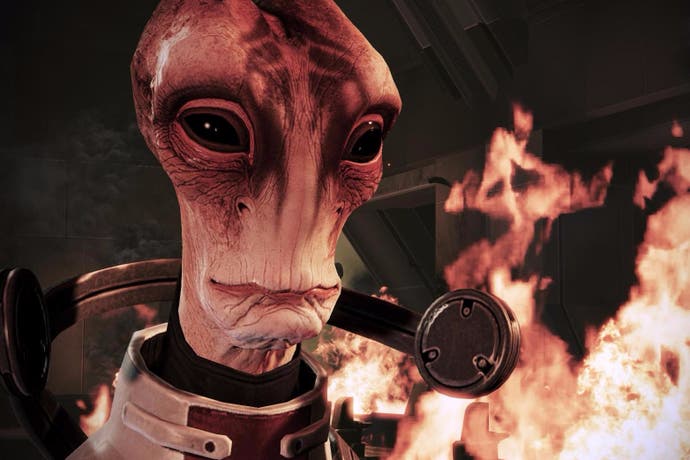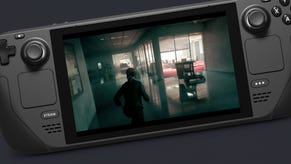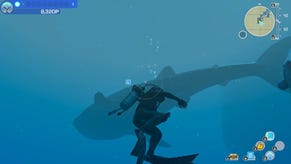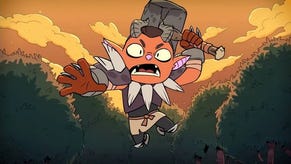Mass Effect's best mission
Curing the genophage.
Ask a Mass Effect fan to pick their favourite mission from the trilogy and you'll probably hear a range of responses. There's the Virmire level in Mass Effect 1, for example, where BioWare unexpectedly forced players to choose between two squadmates' lives. Then there's the superlative Suicide Mission finale of Mass Effect 2, perhaps the most intricately-plotted episode of the whole series. There are whole flowcharts to explain that one.
My favourite mission is Priority: Tuchanka, aka the one in Mass Effect 3 where you cure the genophage. It's a masterpiece full of character moments and a culmination of storylines which had been building since the trilogy began. Best of all, however hard you work, however many side-missions you have completed or what choices you made in previous games - there is no perfect ending.
Tuchanka is sometimes compared with Rannoch, a later ME3 mission where you resolve the similarly long-running conflict between the geth and quarians. Rannoch is great, with some similar emotional beats, but it has a clear "best" ending where it is possible (albeit difficult) to save both races. With Tuchanka there is no easy answer. The mission's choices run deeper, the consequences greater, and the writing is some of the finest throughout the trilogy. Tuchanka's ending also packs an emotional gut punch - depending on your choices it can seal the fate of at least one beloved character - including my favourite of the series, Mordin.
As with many BioWare games, Mass Effect 3 used a writer's room, where a team of scribes collaborated on top-level ideas but then individually took charge of specific characters and story arcs. The genophage, which dominates Mass Effect 3's opening third, was penned by senior writer John Dombrow, along with long-time BioWare colleague Patrick Weekes who wrote Mordin's character in Mass Effect 2.
Some background. The genophage - a sterility plague forced upon the once-rampant krogan - has defined the race since their introduction. Within the series' fiction, it has hobbled the krogan empire, its culture, its future, and left its people fighting amongst themselves until Tuchanka - their homeworld - was a nuclear wasteland. The krogan are now a dying race, near extinction.
But this is all context which you have gained slowly over the trilogy. In Mass Effect 1, the krogan were portrayed as little more than a race of warlike soldiers and mercenaries. Your krogan squadmate Wrex was given a great amount of personality, but was little more than muscle with a mouth. Then, near the end of that game, you visited Virmire - mentioned previously - where you had to fight to keep the genophage in place. You had good motives - you were stopping the krogan from being bred en masse as an army of mindless soldiers - and at the time, only Wrex complained about stopping its cure. Your only option concerning the genophage here was whether Wrex was killed off if he disagreed.
It wasn't until Mass Effect 2 and the introduction of salarian squadmate Mordin Solus that the genophage's ethics were properly discussed. As the key scientist behind its continued existence, Mordin will vehemently defend his work. The genophage's development by salarians and deployment by turians was the right solution at the time, he argues - an alternative to the krogan being wiped out altogether at the end of a bloody expansionist war.
But there's more to it - the krogan were only expansionist because their evolution had previously been "uplifted" by salarian interference, and their warlike nature had been encouraged in order to fight off the rachni, another threat. Mordin's views soften as Mass Effect 2 continues, as you investigate his former assistant Maelon who is trying to cure the genophage via brutal means. You can choose whether to destroy or save the data Maelon collected, despite its unethical origins.
Mass Effect 3 brings all of this to bear on your decision whether to cure the genophage or not - a choice which is coloured as much by your views of the krogan as it is by the fact the galaxy is now fighting for its survival against the Reapers. One way or another, the krogans are needed.
Wrex, now krogan leader, promises krogan support if the genophage is cured. (Or, if Wrex died in Mass Effect 1 on Virmire, then his more aggressive brother Wreav agrees the same in his place.) Mordin formulates a cure using research data from Eve, a female krogan who has volunteered to help. But, before landing on Tuchanka itself, you are given an alternative offer of support from the Dalatrass, the salarian leader, who will give you salarian firepower if you double-cross the krogans instead.
Mission dialogue teases you by offering a fake-out option to immediately inform Wrex, Mordin and Eve of the Dalatrass' plan - or you can choose to keep silent. While you travel to the planet's surface, Wrex and Eve discuss the ancient krogan race - how their people were once civilised, and how the genophage cure will be a new start. If you're not planning to cure the genophage already and are still keeping silent, it's enough to give you pause.
The mission progresses with you fighting your way across Tuchanka's surface against Reaper forces towards the Shroud, a tower-mounted dispersal system where the cure can be released. Wrex (or Wreav) travels with Mordin and Eve while you are forced underground, through ancient catacombs built by once-skilled krogan architects, with murals depicting ancient krogan culture. You are also warned the giant sandworm-like thresher maw Kalros is nearby - a kind of spirit animal for Tuchanka and the mother of all the thresher maws you've fought throughout the series to date.
Crucial to the feeling of this mission are its written and environmental storytelling. You're surrounded by cues which highlight - really, for the first time - the lost potential the krogan once had. From the ornate statues now lying in pieces, to that one patch of green you pass through - a signal that however irradiated Tuchanka is now, the planet and its people are not yet lost for good.
For Mordin, this is an opportunity for redemption. His career has been marked by pragmatism - doing the right thing at the right time - and he is now certain the genophage must be reversed, and that as a key architect of its creation it must fall to him to see it through. He is growing old, keen to retire, and restore the krogan's fertility after his work helped maintain the plague.
The dialogue and relationship you share with Wrex is also key - he's a character you may now have known for hundreds of hours worth of gameplay. "No matter what happens, you've been a champion to the krogan people, and a brother to me," he tells you at one point. Wreav, however, has no connection with Shepard - he's simply keen to return the krogan to strength and give the salarians some payback after the Reapers are defeated. It's a warning that what happens next may depend on the characters you have in play.
Finally, as you approach the Shroud, you must summon Kalros to battle in order to defeat the Reaper standing in your way. It's a cool moment - after hours getting defeated by thresher maws in the Mako in Mass Effect 1, you finally have the mother of all beasts on your side and are able to take down the Reaper in style, as turian pilots sacrifice their lives to ensure you reach your goal. It's one of the series' most satisfying cutscenes, and another example of the galaxy's races pulling together to defeat the Reapers.
In front of the Shroud, which now rattles with explosions, the mission's big moment takes place. Will you cure the genophage, and what will the consequences be? Without Wrex, kept alive in Mass Effect 1, and without Maelon's data, saved in Mass Effect 2 (and which ensures Eve's survival now during the cure's deployment), your choices will change.
It's hard to get to this point in the series and not be moved by the continued reforming of the krogan's image - especially if you have Wrex and Eve as its new, more moderate figureheads. With both alive, Mordin will be especially eager to cure the genophage, and take the long elevator up to the top of the Shroud to get it done. With only one of Eve or Wrex alive, he will be cautious but remain eager to deploy the cure - although he will caution Shepard that the krogan may revert to their old ways in the future. If both Wrex and Eve are dead, Mordin is torn over what to do.
In each scenario you can choose to try and sway Mordin against curing the genophage, and if you haven't yet revealed the Dalatrass' plan you can decide to do so now (or, if you decide not to, Mordin will simply guess based on your hesitations). How Mordin will react to this is based on his estimations for the krogan - unless both Wrex and Eve are dead you cannot convince him to hold back from deploying the cure. If they are, Mordin elects that a cured krogan race stand no chance at a positive future, and he will agree to give up his dream of ending the genophage. In this case, you will gain Mordin and an ample amount of salarian support for the war effort, although leave the krogan ruined, and Mordin's work incomplete.
However, if you persist in demanding he step away and either Wrex or Eve is still alive, you are forced to take one of the coldest decisions in the entire trilogy: to forcibly stop Mordin by shooting him in cold blood. The scientist will still make it to the top of the Shroud, only to die from his injuries before he can disperse the cure.
The most positive of the endings is that the krogan are indeed cured, although to do so Mordin will have to travel to the Shroud's peak and stay there - sacrificing his life to ensure the krogan's future. As such a charismatic character, one of the series' best, it is a bitter pill to swallow. And yet he chooses this fate willingly, satisfied he has reversed the damage he helped cause. If you talked to him regularly in Mass Effect 2 and he admitted his love of opera, he will go out singing.
Mass Effect lets you kill pretty much any squadmate throughout the course of the trilogy if you really, really want to - but most players strive to keep everyone alive. Your squadmates are your family throughout the series, and by Mass Effect 3 they are characters you have grown close to over a number of years. Tuchanka is the first time since Virmire that a squad member is caught up in plot events and required to perish. It's not the last time this happens in Mass Effect 3, but the fact that fan-favourite Mordin is the first - it came as a complete shock. Mordin, as I've said, is my favourite character in the trilogy - by terms he can be complex, nuanced, hilarious and cold. As he approaches the Shroud tower you suddenly understand this is the end for him, and even if you want the genophage cured the game still lets you try and convince him not to sacrifice himself - that there must be some other way to fix this. Mordin gently explains that no, this is his way of making things right. It's genuinely heartbreaking.
The mission concludes with the krogan coming together to celebrate the cure - or mistakenly celebrate if you decided to double cross them. If alive, Wrex and Eve will congratulate Shepard, while Wreav will make his militaristic intentions clear. The former will lament the loss of Mordin, and promise to name their first son after him. "One of the girls," Wrex teases.
Even after you leave Tuchanka, there are far-reaching consequences to your actions. Wreav is successfully deceived by any double-cross, but Wrex will eventually work out your betrayal. Later in the game he will confront you on the Citadel, and you are forced to gun him down in self-defence for your actions - you will lose him and krogan support. The game's Extended Cut ending also paints an incredibly pessimistic future for the krogan should you withhold the cure - especially if Wrex and Eve perish along the way.
Curing the genophage provides the most rounded-out end to the mission, and to the krogan race's arc throughout the entire trilogy - completing their transformation into a mature race. But, playing practically, there's still an element of doubt whether this peace will hold forever. During the mission, Mordin will discuss the possibility of curing the genophage at another time, too, which seems like a logical option - to do so when the krogan have secured a more positive future for themselves without the need for them to fight the Reapers speeding the decision along.
Tuchanka mixes moments of Virmire - the life or death decisions - with the complicated narrative consequences of your past decisions - just like the Suicide Mission. Its end result is affected by both of these - whether Wrex is alive, or whether Mordin is alive (if not, his role is filled by another salarian instead) - but is also an evolution of both. For me, it remains Mass Effect's pinnacle - a perfect mix of characters, complex choices and world-building - and the series finest moment, so far.







.jpg?width=291&height=164&fit=crop&quality=80&format=jpg&auto=webp)

_Rwmp6uD.jpg?width=291&height=164&fit=crop&quality=80&format=jpg&auto=webp)



.png?width=291&height=164&fit=crop&quality=80&format=jpg&auto=webp)